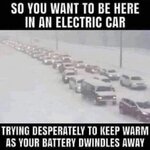Silver Lifetime
- Messages
- 5,696
- Reactions
- 13,960

Tesla supercharging station packed in Oak Brook, dead cars line parking lot due to frigid temps
Electric vehicles may be the way of the future, but many EV owners are having trouble dealing with Chicago’s bitterly cold temperatures.















